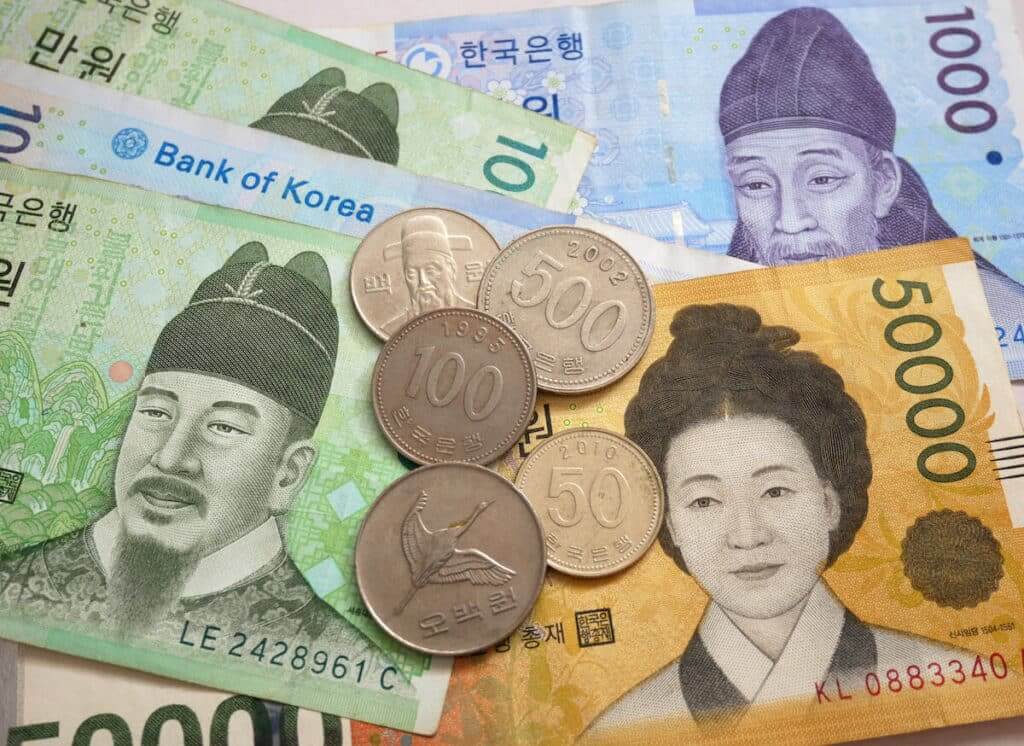Korean Won Rises To Two-Month High
Further government intervention relieved markets, and the South Korean won was trading at a level of $1,350. This had not been seen in the previous two months.

Image via Finance Brokerage
To increase banking system liquidity and lessen the effects of the Gangwon Jungdo Development default. It has raised concerns about a credit crisis in Asia’s fourth-largest economy, South Korea’s central bank recently announced new steps. The strong tightening by the Bank of Korea hurt the once-booming real estate. Liquidity risks are still larger because it is inevitable that the central bank would raise interest rates much higher.
Every currency in the world is weak compared to the US dollar, yet the South Korean economy is incredibly solid at its core because the Korean Won is not the main asset. Weak won is not necessarily a bad thing in an export-driven economy. Although opinions vary from person to person, the general consensus is that even though the economy is still robust on a fundamental level, we must endure this crisis of inflation and rising interest rates.
In contrast, when Japan’s economy is primarily dependent on exports and its contribution to the global economy is weak and declining, they issue an excessive amount of Japanese Yen, similar to the US (collapsing). Japan’s national debt is 266% of GDP, compared to South Korea’s 46.9%. Because someone is bringing up a topic unrelated to this inquiry, I’m bringing up Japan. Let’s think about ourselves first before discussing others. We appreciate your comments and interest in the South Korean problem. When compared to safe-haven currencies like the Japanese Yen, USD, GBP, and EUR. Consider how low the Euro or the Yen would be in relation to the won. Currency is entirely about supply and demand. That is not logical at all.
Korean Won and other currencies
More than ten nations utilize the euro, while the yen is regarded as a safe asset. The Korean Won does not have a good reputation as a secure currency. It is even rumored that the Korean government deliberately keeps the Won low to support export-oriented companies.
Comparable economies like Italy and Spain, albeit not necessarily better economies, have greater currency values for their geopolitical regions. Italy used to use the Lira, which had a very low value when compared to the German Mark and British Pound, but after joining the European Union, they currently use the Euro. If three nations use the same currency and South Korea joins something like the East Asian Union, then it is likely that South Korea’s monetary system will be comparable to that of the Euro.
Additionally, it is a result of the 1997 Asian Financial Crisis. Korea used to peg its currency to the US dollar (800/$), but after the financial crisis, it implemented a flexible exchange system in which the market, rather than the government, controls the supply and demand of currency. Its value was practically cut in half as a result of the system modification (1100–1200/$). Back in 2006, at 920/$, the Korean Won was fairly valued relative to the USD (not excessively so, but also not undervalued as it is currently). Capital flight occurred as a result of the subsequent financial crisis in Europe and the US, and its value has only just just reached its pre-crisis level. But I suppose that the primary cause of this is the government’s slight manipulation of the currency.
More By This Author:
Euro and Sterling rallied against the U.S. dollar. Why’s that?Bitcoin And Ethereum: A Positive Friday Ahead Of The Weekend
Why Did PayPal Lose 7% Of Its Value?
Disclaimer: Finance Brokerage and its workforce cannot, and do not, absolute warrant the accuracy, relevancy, reliability, consistency, and completeness of any information and materials in the ...
more


